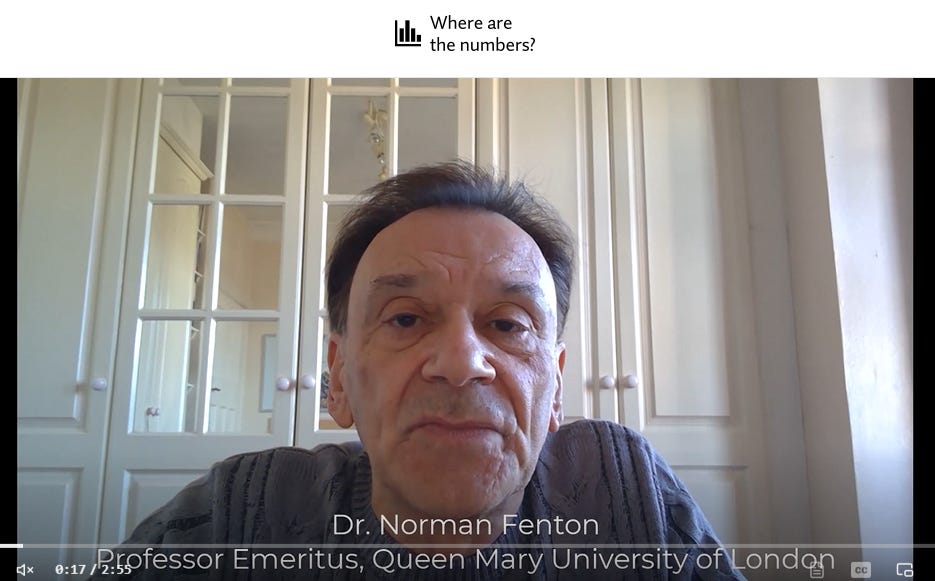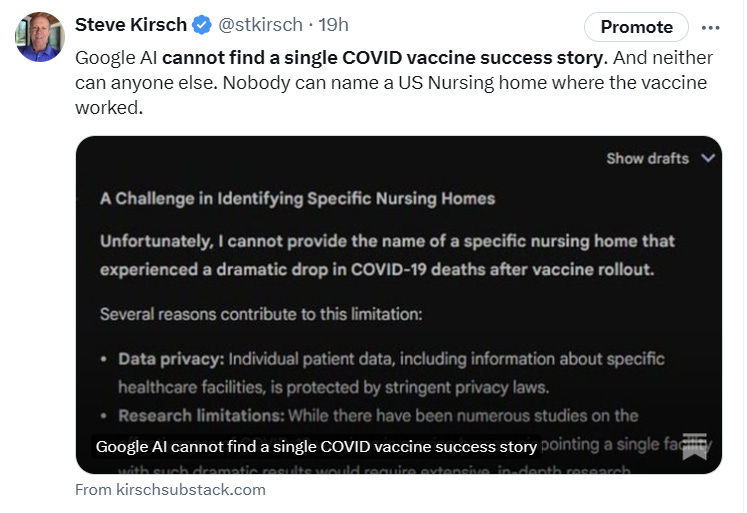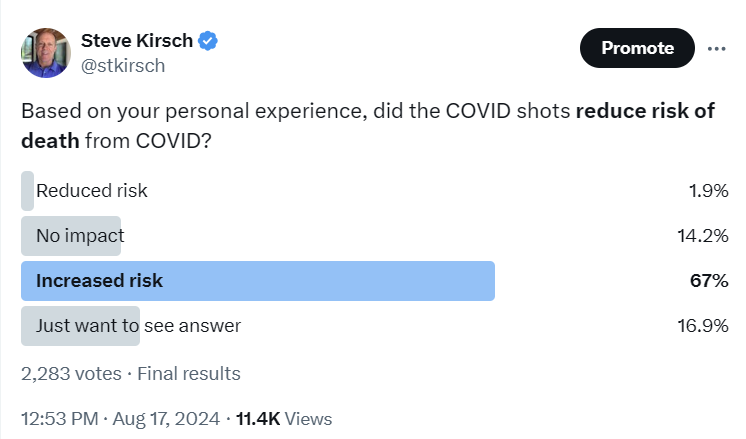Did the COVID vaccines really save 20M lives worldwide?
No. But that doesn't keep people from saying that. The reality is no lives were saved which is why there aren't any success anecdotes.
Executive summary
A paper published in The Lancet in 2022 entitled Global impact of the first year of COVID-19 vaccination: a mathematical modelling study, estimated that COVID vaccinations prevented nearly 20 million excess deaths.
Here’s what I and others I respect think of this modeling study.
My take
Modeling studies can be very inaccurate and misleading.
The study shows that for every 10,000 people vaccinated, 36 deaths from COVID are averted!
Over 5.5 billion people have taken the shot, so the paper calculates the benefit at 5.5e9*36/10000 = 19.8M lives saved.
That’s how they get the number. It’s that simple.
So did they do a reality check on this? No, of course not. Otherwise the paper wouldn’t be accepted.
In the Pfizer trial, there were 22,030 who got the shot. So that means the drug averted 2.2*36 deaths = 79 COVID deaths.
It’s pretty well accepted that the vaccine only lasts 6 months which is why they tell you to get a booster every 6 months.
So how many net COVID deaths were “saved” in the Pfizer clinical trial? Per the supplementary appendix it was just 1.
Randomized clinical trials are among the highest quality scientific evidence available.
1 isn’t anywhere close to 79.
So we have to reject the Lancet COVID lives saved modeling study as wildly inaccurate.
And yet, the paper isn’t retracted!?! Which of course causes us to be very suspicious of anything published in medical journals nowadays that is COVID vaccine related.
Trust the Evidence weighs in (Carl Heneghan and Tom Jefferson)
From Trust the Evidence article, “Excess deaths in the spotlight once again”
Suddenly, it's OK to question the vaccine narrative. The Lancet estimated that vaccinations prevented 19·8 million excess deaths. Mathematical modelling should not be used to justify the policy—the latest report shows the numbers don’t add up.
So they make 2 key points:
Don’t use math models for public policy because this is too unreliable
The numbers predicted by the model don’t match reality
Note that TTE is written by two of the most highly respected evidence-based scientists in the world who have been demonized and demonetized for telling the truth. It is only through support of their subscribers on Substack that they can continue on with the important work they are doing.
Their single biggest frustration: the total lack of data transparency
I spoke with one of the authors for nearly two hours today and their single biggest frustration is that the governments hide the very data that they need to do a credible safety analysis.
I asked “How do they justify hiding the data from lawmakers?”
The response the UK government gave when a committee of Parliament requested the safety data is that the safety information is “Commercially Confidential.”
Wait a second…
If the vaccines are safe, why do the manufacturers need to keep the data a secret??
I still can’t figure that one out.
“Where are the numbers?” weighs in (Norman Fenton, Martin Neil)
Check out their excellent article, “Why we cannot ignore the Lancet claim that the vaccines saved 20 million lives” which basically says the Lancet paper is junk science (“obviously flawed modelling”), but that we can’t just ignore it because the vaccine makers are using the study to make the claim that the vaccine harms are minimal compared to the benefits.
I highly recommend watching all of the videos in that article. They are all short. You’ll love them!
So how many lives were saved by the shots?
Zero saved based on what I know.
And 10M or more lives were lost worldwide.
Consider for example:
The case-fatality rate went up after the COVID vaccines rolled out in the US Nursing Homes. It should have dropped precipitously.
The all-cause death rates went up by 8X after the shots rolled out at Apple Valley Village, a nursing home in Minnesota where I was given the date of the vaccine rollout.
A VA study showed neither COVID vaccines nor influenza vaccines worked to reduce hospitalization rates.
The fully reported, gold standard Czech Republic data showed the COVID vaccines clearly increased all-cause mortality, e.g., Moderna killed 30% more people than Pfizer which is a train wreck.
There are no success anecdotes that I could find. Google AI couldn’t cite a single facility where death rates went down and the excuses it gave were completely bogus as I detail in this substack article.
Nobody thinks that the vaccines worked based on their own personal observations. If the vaccines were so successful, how do we explain how nearly everyone observed the opposite?
How many people were killed by the shot?
This estimate of 17M deaths worldwide is in the right ballpark from everything I know:
The authors have no conflicts of interests and no agenda other than to objectively report what they observe.
Tracey Beth Hoeg tried to debunk this study, but she wasn’t very convincing as you can see here.
What do you think? How many lives do you think the COVID vaccines saved?
|
Summary
Government officials are told by the vaccine makers to pay attention to the obviously flawed Lancet modeling study as the justification for vaccinating everyone.
Yet UK lawmakers were told by UK government agencies to “pound sand” when they ask for the actual safety data.
Sadly, there are only a few members of the EU Parliament, UK Parliament, and US Congress who have the critical thinking skills to realize that the lack of data transparency is a huge problem.
Anytime safety data is withheld from public view, you should just say “No” when asked to take any medical intervention.
You're currently a free subscriber to Steve Kirsch's newsletter. For the full experience, upgrade your subscription.





No comments:
Post a Comment